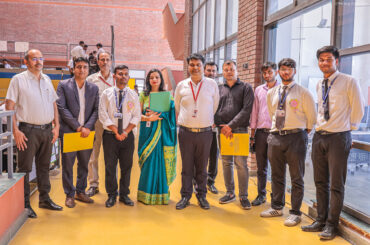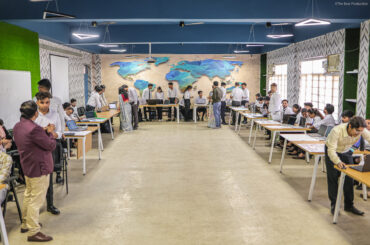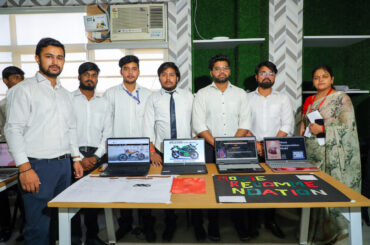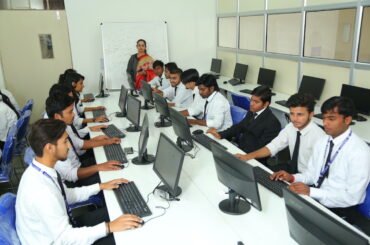BCA Computer Science
The Bachelor of Computer Applications (BCA) in Computer Science is an undergraduate degree program designed to equip students with comprehensive knowledge and skills in computer science and its applications.
This three-year course covers various aspects of computing, including programming languages, software development, database management, computer networks, web development, and cybersecurity.
The curriculum is designed to provide a strong foundation in theoretical and practical aspects of computer science, preparing students for careers in the IT industry or for further studies in advanced computer science fields.
With a focus on hands-on learning, students gain practical experience through projects, internships, and workshops, making them proficient in solving real-world problems using modern technology.
Graduates of the BCA program are well-positioned for roles such as software developers, systems analysts, network administrators, and IT consultants, with opportunities for growth in the ever-evolving tech industry.
Some of the most opted courses in India and St. Andrews college or different Engineering college or Management colleges are as follows:-
- Btech
- Btech CSE
- Btech ETCE
- MTech
- BCA
- BBA
- MBA
- MCA
- DPharma – St. Andrews College of Pharmacy
- BPharma – St. Andrews College of Pharmacy
- BArch – St. Andrews College of Architecture
Advantages of Pursuing BCA course in Computer Science
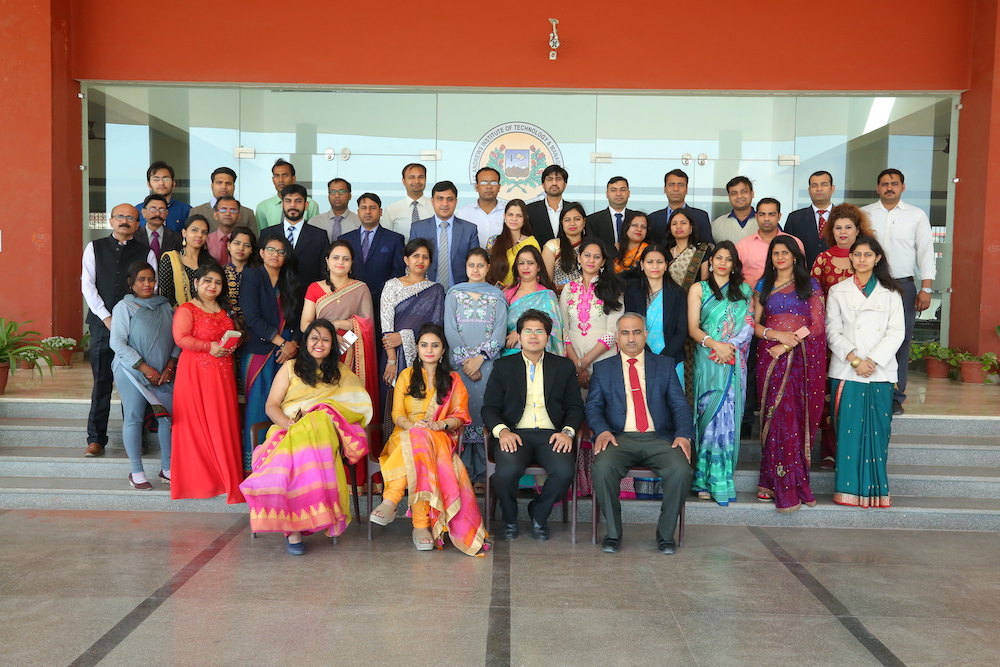
Pursuing a Bachelor of Computer Application (BCA) course in Computer Science offers numerous advantages for students looking to build a career in the rapidly growing field of IT. The program provides a strong foundation in computer science principles and practical skills, opening up diverse career opportunities.
Here are some of the key advantages:
Comprehensive Curriculum
The BCA course covers a broad range of subjects, including coding languages, database management, web development, software engineering, networking, data structures, algorithms, operating systems, computer graphics, and artificial intelligence. This comprehensive curriculum ensures that students gain a holistic understanding of computer science and its applications.
Skill Development
BCA course students develop essential IT skills in various coding languages such as C, C++, Java, and Python. They also learn web development technologies, database management, and software engineering principles. These skills are highly sought after in the IT industry and provide a solid foundation for software engineering, system analysis, and other technical roles.
Practical Experience
The BCA course emphasizes hands-on experience through projects, lab work, and internships. Students have the opportunity to apply theoretical knowledge to real-world scenarios, enhancing their problem-solving abilities and practical skills. This practical experience is invaluable for understanding the complexities of software engineering and system management.
Industry Relevance
The BCA curriculum is designed to align with the latest industry trends and technologies. Courses on emerging fields such as artificial intelligence, machine learning, and cloud computing ensure that graduates are equipped with up-to-date knowledge and skills. This industry relevance makes BCA degree holder attractive to employers seeking professionals who can contribute to cutting-edge projects.
Diverse Career Opportunities
Graduates of the BCA course can pursue a wide range of career paths. Common roles include software developer, web developer, database administrator, system analyst, network administrator, AI/ML engineer, and cybersecurity analyst. The versatility of the BCA degree allows graduates to adapt to various roles and industries, from tech startups to established corporations.
Pursue Higher Education and Specialization
A BCA degree provides a strong foundation for higher education. Graduates can pursue a Master of Computer Applications (MCA) or other advanced degrees in computer science, IT, or related fields. Specialized certifications in areas such as cloud computing, cybersecurity, and data science can further enhance career prospects and professional growth.
Lucrative Salary Packages
The demand for skilled IT professionals often translates to attractive salary packages for BCA degree holder. As they gain experience and expertise, they can command higher salaries and benefit from career advancement opportunities. Roles in software engineering, AI, and cybersecurity are particularly well-compensated due to the high demand for specialized skills.
Entrepreneurial Opportunities
With a solid grounding in computer science and practical skills, BCA degree holder are well-positioned to start their own ventures. Whether it’s developing innovative software solutions, launching a tech startup, or providing IT consulting services, the entrepreneurial opportunities for BCA degree holder are abundant.
Global Opportunities
The IT industry is global, and a BCA course can open doors to international career opportunities. Many multinational companies seek talented IT professionals who can work in diverse and dynamic environments. Additionally, the skills acquired during the BCA program are transferable across borders, making it easier for graduates to pursue careers abroad.
Contribution to Society
IT professionals play a crucial role in shaping the future by developing technologies that improve lives and drive progress. BCA students can contribute to various sectors, including healthcare, education, finance, and entertainment, by creating innovative solutions that address real-world problems. This sense of contribution and impact can be highly fulfilling.
Personal and Professional Growth
The rigorous training and diverse experiences offered by the BCA program foster both personal and professional growth. Students develop critical thinking, analytical skills, and a problem-solving mindset. They also enhance their communication and teamwork abilities, which are essential for collaborative projects and professional success.
BCA Admission Process in Computer Science

BCA admission process for a Bachelor of Computer Application (BCA) in Computer Science varies depending on the institution, but it generally follows a standard procedure involving eligibility criteria, application submission, colleges conduct entrance exams (in some cases), and selection based on merit.
Many institutions conduct BCA entrance exams for admissions. Examples of such exams include IPU CET, and AIMA UGAT. These exams typically cover subjects like Mathematics, English, and Computer Science, assessing the candidate’s aptitude and knowledge in the field of computer applications.
Here’s a detailed overview of the typical BCA admission process:
BCA Eligibility Criteria
Educational Qualifications:
Candidates must have completed their 10+2 (or equivalent) education from a recognized board.
A background in Mathematics, Computer Science, or IT is often preferred, although it is not mandatory at all institutions.
Some institutions may require specific minimum marks, usually around 50-60% aggregate in the qualifying examination.
Age Limit:
Generally, candidates should be between 17 and 25 years of age. However, age limits can vary by institution.
Application Process
Research and Selection of Colleges:
Candidates should start by researching various colleges and universities that offer BCA programs, considering factors like location, reputation, course curriculum, and fee structure.
Application Form:
Most institutions provide application forms online on their official websites. Some may also offer offline forms.
Candidates must fill out the application form with the required personal and educational details accurately.
Application Fee:
An application fee is typically required, which can be paid online or through other accepted methods as specified by the institution.
Bachelor of Computer Applications Entrance Exam (If Applicable)
National/State Level Exams:
Various institutions and states conduct BCA entrance exams for admissions to BCA programs. Examples of these exams include IPU CET (Indraprastha University Common Entrance Test), and others. National and state-level exams like these are crucial for securing a seat in reputed colleges.
These exams test candidates on subjects like Mathematics, Logical Reasoning, General Awareness, and English language proficiency.
Institution-Specific Exams:
Certain universities may have their own entrance exam to assess the aptitude and skills of applicants.
Exam Preparation:
Candidates should prepare for these exams by studying the relevant subjects and practicing past papers and sample questions.
Selection Process
Merit-Based Admission:
In many institutions, admissions are based on the marks obtained in the 10+2 examination. Candidates with higher marks are given preference.
Entrance Exam Scores:
For institutions that require entrance exam, candidates are selected based on their performance in the exam.
Personal Interview/Counseling:
Some colleges conduct personal interviews or counseling sessions as part of the selection process. This may include a discussion of the candidate’s interest in computer applications, career goals, and academic achievements.
Document Verification:
Shortlisted candidates are required to provide original documents for verification. This typically includes mark sheets, certificates, identity proof, and passport-sized photographs.
Admission Confirmation
Provisional Admission:
After document verification, candidates may receive provisional admission letters, which they need to confirm by paying the required admission fees within the stipulated time.
Final Admission:
Once the fees are paid, the admission is confirmed, and students are officially enrolled in the BCA program.
BCA in Computer Science Fees
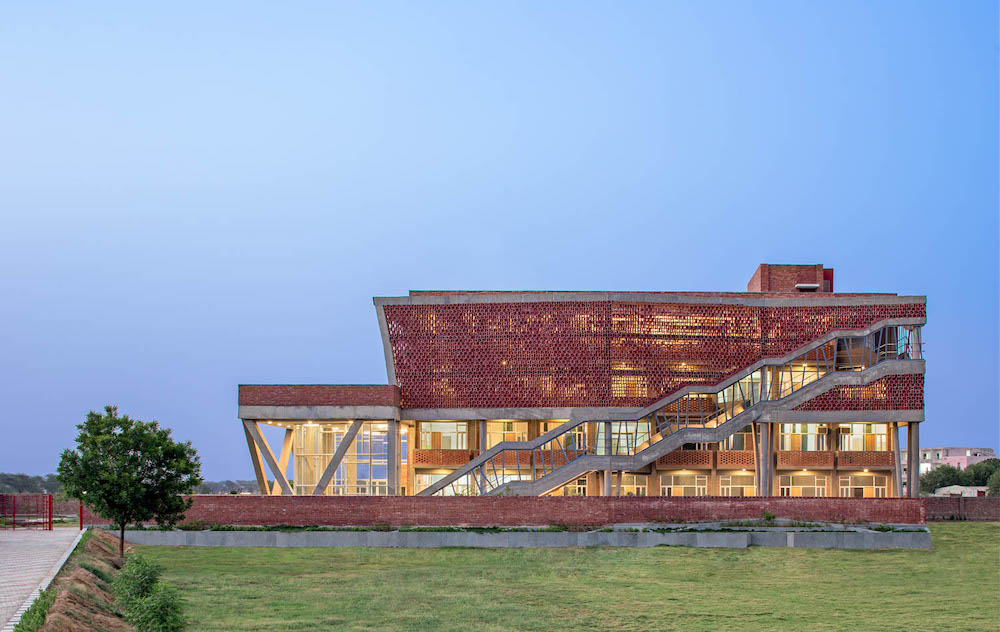
The course fee for a Bachelor of Computer Application (BCA) in Computer Science can vary widely depending on the institution, location, and specific amenities or additional courses offered by the program.
Below is a general overview of the fee structure you might expect at different types of institutions in India:
Government/Public Institutions
Government or public institutions often have lower fees compared to private institutions due to subsidies and government funding.
Annual course Fee: INR 10,000 to INR 50,000
Total Program Cost: INR 30,000 to INR 1.5 lakhs
Private Institutions
Private institutions typically charge higher BCA fees, but they may also offer better infrastructure, faculty, and placement opportunities.
Annual Fees: INR 50,000 to INR 2,00,000
Total Program Cost: INR 1.5 lakhs to INR 6 lakhs
Deemed Universities
Deemed universities, which operate independently but are recognized by the University Grants Commission (UGC), also tend to have higher fees.
Annual Fees: INR 1,00,000 to INR 2,50,000
Total Program Cost: INR 3 lakhs to INR 7.5 lakhs
Autonomous Colleges
Autonomous colleges, which have the freedom to design their curriculum and are often affiliated with a larger university, may have a varied fee structure.
Annual Fees: INR 60,000 to INR 2,00,000
Total Program Cost: INR 1.8 lakhs to INR 6 lakhs
Breakdown of Fees
Tuition Fees: This is the main component of the fee structure, covering the cost of education and faculty.
Examination Fees: Charges for semester exams and other assessments.
Library Fees: For the use of library resources and services.
Laboratory Fees: Covers the cost of using computer labs and other practical sessions.
Development Fees: Charges for infrastructural development and maintenance.
Miscellaneous Fees: This includes fees for extracurricular activities, sports, and other student services.
Skills You Develop during BCA in Computer Science
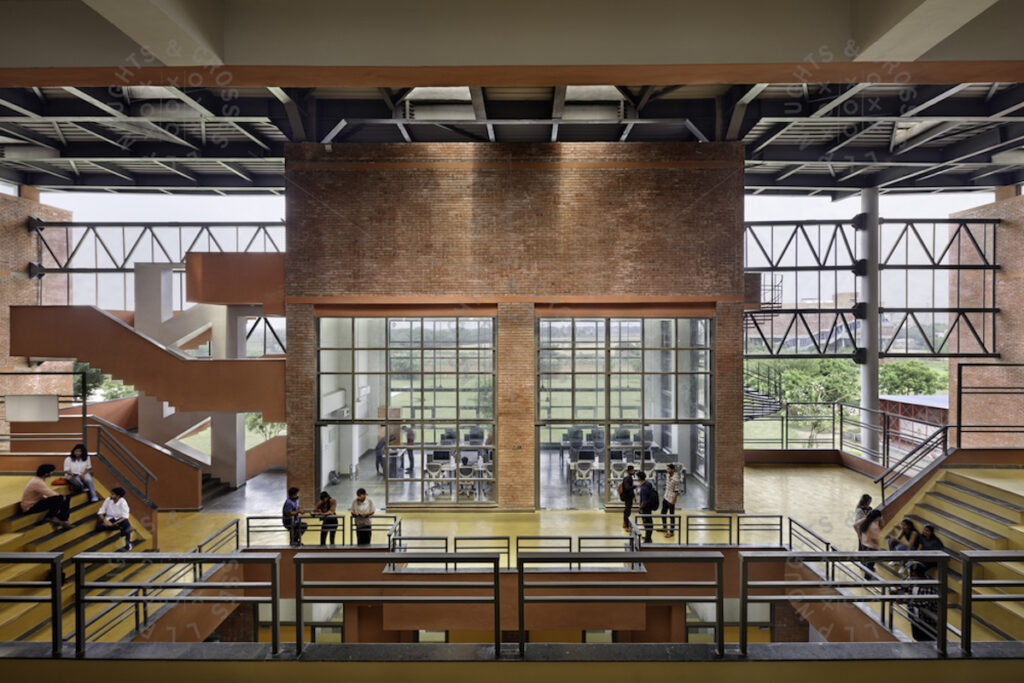
Pursuing a Bachelor of Computer Application (BCA) in Computer Science equips students with a broad range of skills that are essential for a successful career in the IT industry. These skills span technical expertise, analytical abilities, and soft skills.
Here are the key skills developed during a BCA program:
Technical Skills
Programming Proficiency:
Mastery of coding languages such as C, C++, Java, Python, and JavaScript.
Ability to write, debug, and maintain code efficiently.
Web Development:
Skills in HTML, CSS, JavaScript, and frameworks like Angular and React.
Knowledge of web development principles and best practices.
Database Management:
Proficiency in SQL and experience with database management systems like MySQL and Oracle.
Skills in database design, normalization, and query optimization.
Software Engineering:
Understanding of software development life cycle (SDLC) and Agile methodologies.
Experience in software design, development, testing, and maintenance.
Networking:
Knowledge of network protocols, architecture, and security.
Skills in configuring and managing network infrastructure.
Data Structures and Algorithms:
Ability to implement and optimize various data structures (e.g., arrays, linked lists, trees, graphs).
Proficiency in algorithm design and analysis.
Operating Systems:
Understanding of the functions and architecture of operating systems like Windows and Linux.
Skills in system administration and resource management.
Computer Graphics:
Basics of graphics programming and animation techniques.
Skills in using graphic design tools and software.
Artificial Intelligence and Machine Learning:
Introduction to AI concepts and machine learning algorithms.
Basic skills in developing and implementing AI models.
Analytical Skills
Problem-Solving:
Strong analytical and logical thinking abilities.
Capability to identify problems, analyze requirements, and develop effective solutions.
Critical Thinking:
Ability to evaluate and synthesize information to make informed decisions.
Skills in assessing the impact of different approaches and choosing optimal solutions.
Data Analysis:
Proficiency in analyzing data and extracting meaningful insights.
Skills in using data analysis tools and techniques.
Soft Skills
Communication:
Effective verbal and written communication skills.
Ability to convey technical information clearly and concisely to non-technical stakeholders.
Teamwork:
Experience in collaborative projects and working effectively in teams.
Skills in conflict resolution and constructive feedback.
Time Management:
Ability to manage time effectively and meet deadlines.
Skills in prioritizing tasks and managing multiple projects simultaneously.
Adaptability:
Capacity to adapt to new technologies and changing industry trends.
Skills in continuous learning and professional development.
Project Management:
Basic project management skills, including planning, execution, monitoring, and closure.
Ability to manage resources, timelines, and deliverables effectively.
Specialized Skills
Cybersecurity:
Understanding of cybersecurity principles and practices.
Skills in protecting systems and networks from cyber threats.
Cloud Computing:
Knowledge of cloud computing concepts and services.
Skills in deploying and managing applications on cloud platforms like AWS, Azure, or Google Cloud.
Mobile App Development:
Skills in developing mobile applications for Android and iOS platforms.
Proficiency in using mobile application development frameworks and tools.
Practical Experience:
Hands-On Projects:
Experience in developing real-world applications as part of coursework.
Skills in project planning, coding, testing, and deployment.
Internships:
Practical exposure through internships in the IT industry.
Opportunity to apply theoretical knowledge in real-world scenarios.
Workshops and Seminars:
Participation in workshops and seminars to stay updated with the latest trends and technologies.
Networking with industry professionals and peers.
Programming Languages Taught in BCA Computer Science

In a Bachelor of Computer Application (BCA) program in Computer Science, students typically learn a variety of programming languages to build a strong foundation in software engineering and computer science principles.
Here are some of the common programming languages taught in BCA Computer Science programs:
C Programming
C is often the first programming language taught in BCA courses. It provides a strong understanding of basic programming concepts such as variables, data types, control structures, functions, and arrays.
C++
Building upon C, C++ introduces concepts of object-oriented programming (OOP), including classes, objects, inheritance, polymorphism, and encapsulation. It is widely used for system programming, game development, and application software.
Java
Java is a versatile programming language known for its platform independence and robustness. BCA students learn Java to develop desktop, web, and mobile applications. Topics typically include core Java concepts, object-oriented programming, exception handling, and multithreading.
Python
Python is gaining popularity in BCA programs due to its simplicity, readability, and versatility. It is used for web development, data analysis, artificial intelligence, and scientific computing. Students learn Python for its syntax, data structures, file handling, and libraries like NumPy and Pandas.
JavaScript
JavaScript is essential for web development, enabling students to create dynamic and interactive web pages. BCA courses cover JavaScript fundamentals, DOM manipulation, event handling, AJAX, and popular frameworks like React and Angular.
SQL
Structured Query Language (SQL) is taught for database management. Students learn SQL syntax, database design, normalization, querying, and manipulation of relational databases. They also gain practical experience with database management systems like MySQL, PostgreSQL, or Oracle.
PHP
PHP (Hypertext Preprocessor) is a server-side scripting language commonly used for web development. BCA students learn PHP to create dynamic web pages, handle forms, interact with databases, and develop web applications.
HTML/CSS
While not traditional programming languages, HTML (Hypertext Markup Language) and CSS (Cascading Style Sheets) are essential for web development. Students learn HTML for creating the structure of web pages and CSS for styling and layout.
BCA in Computer Science Course Duration
The BCA course duration of a Bachelor of Computer Application (BCA) in Computer Science program typically spans three academic years. However, variations in the duration may exist based on factors such as the institution’s academic calendar, curriculum structure, and any additional requirements or specializations offered within the program.
Standard BCA Course Duration:
Academic Years: BCA programs generally follow a semester system, with each academic year consisting of two semesters.
Semester Duration: Each semester typically lasts for approximately 6 months.
Total Duration: With three academic years, the total duration of the BCA program is usually 6 semesters, totaling three years of full-time study.
Additional Considerations:
Internships/Projects: Some BCA programs may include internships or project work as part of the curriculum, which can extend the overall duration of the program. These experiences provide practical exposure and industry-relevant skills to students.
Elective Courses/Specializations: Depending on the institution’s curriculum, students may have the option to choose elective courses or specializations in specific areas of computer science. These additional courses may add extra semesters or credits to the program duration.
Part-Time or Distance Learning: In some cases, institutions may offer part-time or distance learning options for BCA programs, which could have a different duration compared to full-time, on-campus programs.
Co-op Programs: Cooperative education (co-op) programs, where students alternate between academic study and paid work placements, may have a longer duration due to the additional work terms.
BCA in Computer Science Curriculum
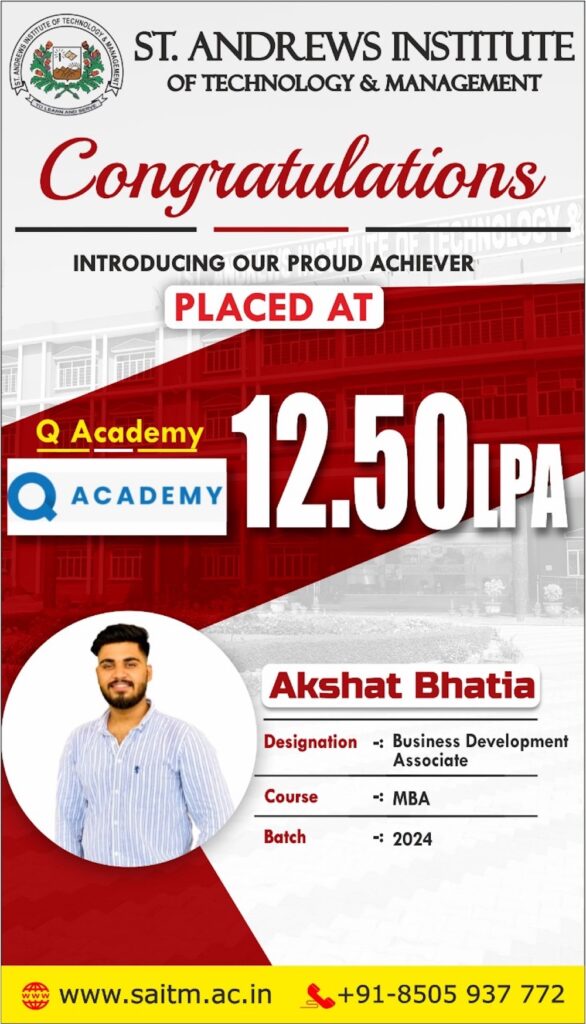
BCA Syllabus for a Bachelor of Computer Application (BCA) in Computer Science is designed to provide students with a comprehensive understanding of computer science principles, programming languages, software engineering methodologies, and practical skills required for a career in the IT industry.
While specific courses may vary among institutions, here is a typical BCA Syllabus:
First Year:
Semester I:
Introduction to Computer Science
Fundamentals of Information Technology
Mathematics for Computing
Programming Principles and Algorithms
Computer Laboratory (Programming Practice)
Semester II:
Data Structures
Object-Oriented Programming using C++
Digital Electronics
Operating Systems Concepts
Computer Laboratory (Data Structures and C++ Programming)
Second Year:
Semester III:
Computer Organization and Architecture
Database Management Systems
Web Technology
Software Engineering Principles
Computer Laboratory (Web Development)
Semester IV:
Advanced Programming with Java
System Analysis and Design
Computer Networks
Numerical Methods
Computer Laboratory (Java Programming and Networking)
Third Year:
Semester V:
Artificial Intelligence
Software Testing and Quality Assurance
Cyber Security
Elective I (e.g., Mobile Application Development, Cloud Computing)
Computer Laboratory (AI and Software Testing)
Semester VI:
Project Management
Industrial Training/Internship
Project Work (with presentation and report submission)
Elective II (e.g., Data Analytics, Internet of Things)
Viva Voce (Project Presentation and Defense)
BCA in Computer Science vs. B.Sc in Computer Science
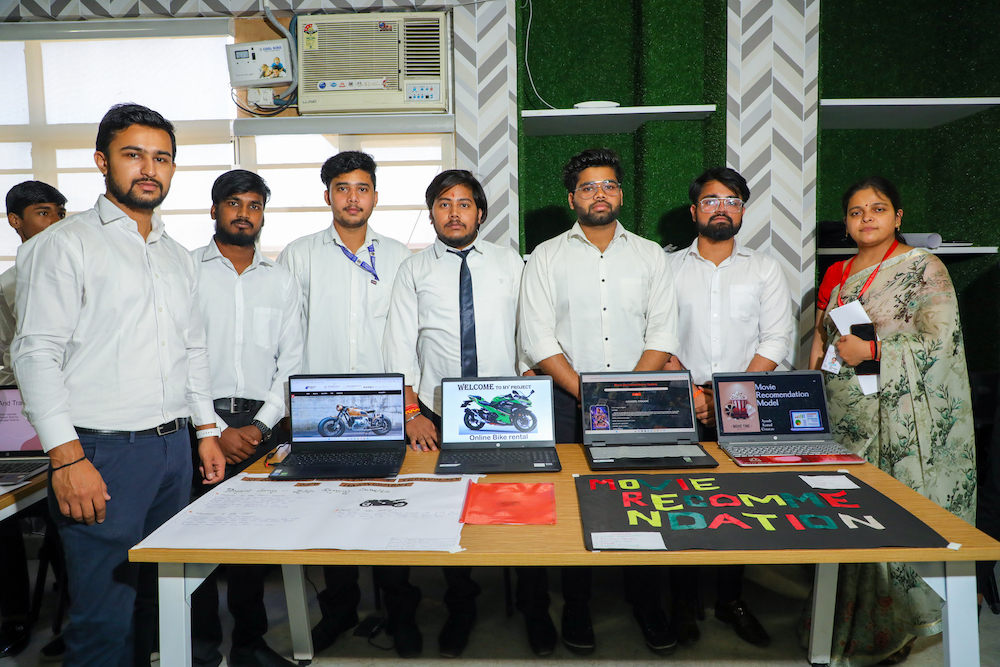
Choosing between a Bachelor of Computer Application (BCA) in Computer Science and a Bachelor of Science (B.Sc) in Computer Science depends on various factors, including career goals, interests, curriculum, and personal preferences.
Here’s a comparison between the two programs to help you make an informed decision:
BCA in Computer Science:
Focus:
BCA programs typically focus on practical skills and applications of computer science in the IT industry. The curriculum emphasizes programming, software engineering , database management, and web technologies.
Professional Orientation:
BCA programs are often more professionally oriented, aiming to prepare students for specific roles in software engineering, systems analysis, database administration, and other IT-related fields.
Industry Relevance:
BCA programs are designed to align closely with industry requirements, offering practical training, internships, and industry projects to enhance employability.
Curriculum:
The BCA curriculum may include courses specific to software development methodologies, project management, and professional skills development in addition to core computer science subjects.
Career Opportunities:
Graduates of BCA programs are well-equipped for careers in software development, web development, database administration, system analysis, IT consulting, and various roles in the IT industry.
B.Sc in Computer Science:
Focus:
B.Sc programs in Computer Science typically provide a more theoretical and comprehensive understanding of computer science principles, algorithms, and mathematical foundations.
Academic Orientation:
B.Sc programs may focus on academic research, theoretical concepts, and advanced topics in computer science, preparing students for further studies at the postgraduate level or research-oriented careers.
Flexibility:
B.Sc programs may offer more flexibility in course selection, allowing students to tailor their curriculum based on their interests, whether in computer science theory, mathematics, or interdisciplinary areas.
Curriculum:
The B.Sc curriculum often includes a stronger emphasis on mathematics, algorithms, data structures, computer architecture, and theoretical computer science topics.
Career Opportunities:
Graduates of B.Sc programs in Computer Science have a wide range of career options, including software development, research, academia, data analysis, machine learning, cybersecurity, and other specialized fields.
Top BCA Colleges in India for BCA in Computer Science
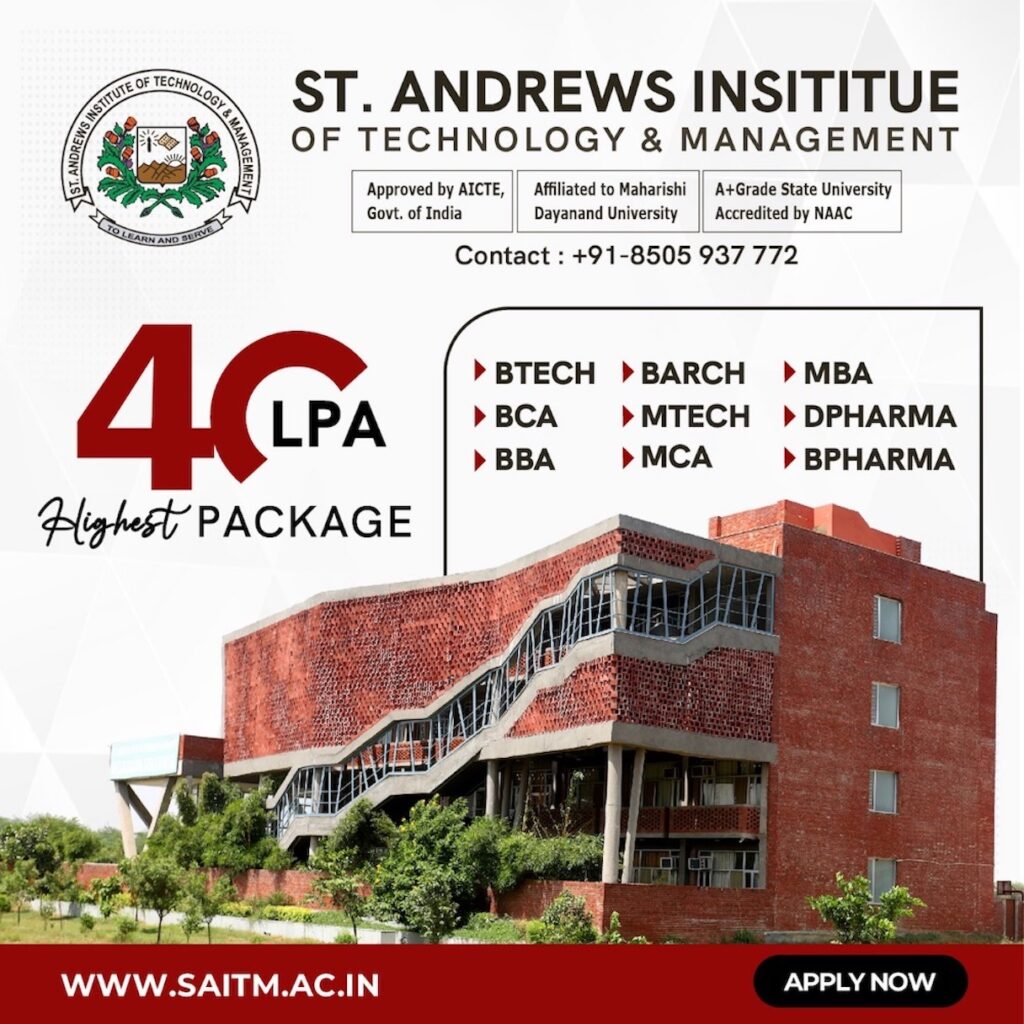
There are several prestigious college in India for BCA in Computer Science known for their quality education, experienced faculty, and infrastructure.
Here are some of the top BCA college for BCA course in India:
University of Delhi, Delhi
Colleges providing BCA course in Delhi University are as follows:
Shaheed Sukhdev College of Business Studies (SSCBS)
Maharaja Agrasen Institute of Management Studies (MAIMS)
Deen Dayal Upadhyaya College (DDUC)
Maharaja Agrasen College
St. Andrews Institute of Technology & Management (SAITM), Gurgaon
St. Andrews Institute of Technology & Management (SAITM) offers a Bachelor of Computer Applications (BCA) program aimed at providing students with a strong foundation in computer science and its applications.
National Institute of Technology (NITs)
NITs are prestigious institutions offering BCA courses along with other engineering and technology courses.
Indian Institutes of Information Technology (IIITs)
IIITs are autonomous institutes offering specialized courses in IT.
Banaras Hindu University (BHU), Varanasi
BHU offers a BCA course through the Faculty of Science, known for its academic excellence and research opportunities.
Maharshi Dayanand University (MDU), Rohtak
MDU offers a well-rounded BCA course through its affiliated colleges. The university focuses on providing quality education and hands-on experience to prepare students for the IT industry.
Guru Gobind Singh Indraprastha University (GGSIPU), New Delhi
GGSIPU offers a highly respected BCA course through various affiliated colleges. The curriculum is industry-oriented, and the university emphasizes practical skills and placements.
University of Madras, Chennai
Colleges affiliated with the University of Madras, such as
Queen Mary’s College offer BCA course with a strong emphasis on theoretical concepts and practical skills.
University of Pune, Pune:
Government colleges affiliated with the University of Pune, such as
Brihan Maharashtra College of Commerce (BMCC) offer BCA courses with a focus on industry-oriented curriculum and placement support.
University of Hyderabad, Hyderabad
The School of Computer and Information Sciences at the University of Hyderabad offers a BCA course known for its interdisciplinary approach and research opportunities.
Career Prospects with a BCA in Computer Science
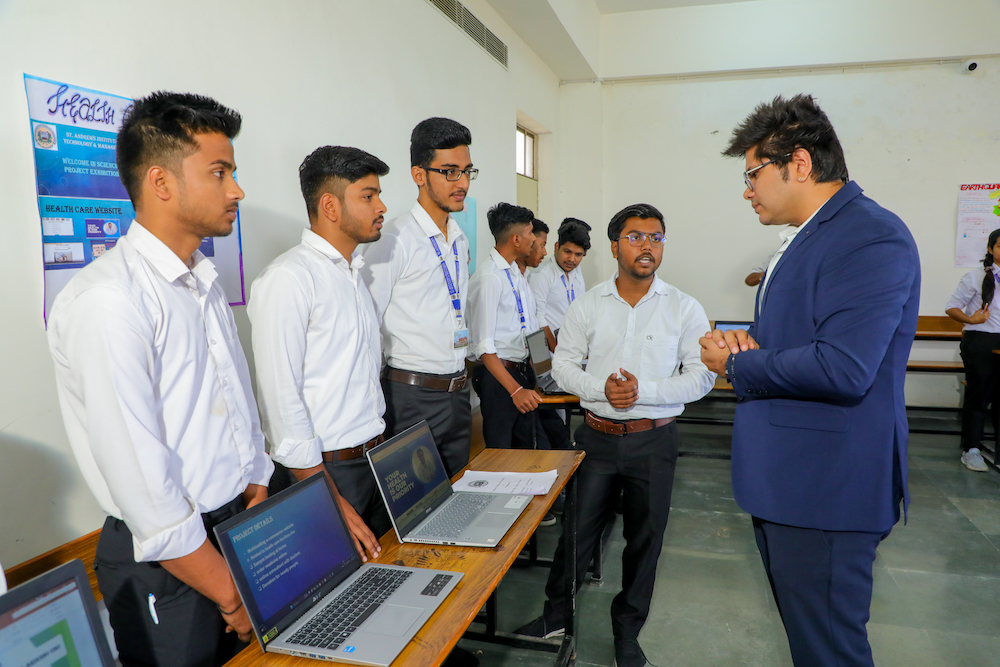
A Bachelor of Computer Applications (BCA) in Computer Science opens up a wide range of career prospects in the dynamic and rapidly growing field of information technology (IT).
Here are some of the career opportunities available to BCA degree holders:
Software Developer/Engineer
BCA degree holders can work as software developers or engineers, designing, developing, testing, and maintaining software applications for various platforms and industries. They may specialize in areas such as web development, mobile app development, or enterprise software solutions.
System Analyst
BCA degree holder can pursue careers as system analysts, analyzing business requirements, designing system solutions, and coordinating with developers and stakeholders to implement and maintain IT systems that meet organizational needs.
Database Administrator
BCA graduates with expertise in database management can work as database administrators, responsible for designing, implementing, and managing databases, ensuring data security, integrity, and optimal performance.
Network Administrator/Engineer
BCA graduates can work as network administrators or engineers, managing and maintaining computer networks, configuring network devices, troubleshooting network issues, and ensuring network security and performance.
Web Developer
BCA graduates with skills in web development technologies such as HTML, CSS, JavaScript, and various frameworks can pursue careers as computer programmer, web developers, creating dynamic and interactive websites, web applications, and e-commerce platforms.
Mobile App Developer
BCA graduates with expertise in mobile app development platforms such as Android, iOS, or cross-platform frameworks can work as mobile app developers, creating innovative and user-friendly mobile applications for smartphones and tablets.
Quality Assurance Analyst/Tester
BCA graduates can work as quality assurance analysts or testers, responsible for testing software applications, identifying bugs and issues, and ensuring the quality, reliability, and usability of software products before release.
IT Consultant
BCA graduates can work as IT consultants, providing expert advice and solutions to organizations on various IT-related issues, including system design, software selection, implementation, and IT strategy development.
IT Project Manager
BCA graduates with strong leadership and project management skills can pursue careers as IT project managers, overseeing IT projects from initiation to completion, managing resources, timelines, and budgets, and ensuring project success.
Data Analyst/Scientist
BCA graduates with skills in data analysis, statistics, and data visualization can work as data analysts or data scientists, analyzing large datasets, extracting insights, and making data-driven decisions to drive business growth and innovation.
Cybersecurity Analyst
BCA graduates with expertise in cybersecurity can work as cybersecurity analysts, identifying security threats and vulnerabilities, implementing security measures, and ensuring the confidentiality, integrity, and availability of information systems and data.
IT Trainer/Educator
BCA graduates can pursue careers as IT trainers or educators, sharing their knowledge and expertise with others through teaching, training, or academic research in educational institutions, training centers, or corporate settings.
Salary After Completing BCA in Computer Science

The salary for individuals completing a Bachelor of Computer Applications (BCA) in Computer Science can vary depending on factors such as the individual’s skills, experience, location, industry, and the specific role they take up.
However, here’s a general overview of the salary range you can expect after completing a BCA in Computer Science:
Entry-Level Positions:
Software Developer/Engineer
Salary Range: ₹2.5 lakhs to ₹6 lakhs per annum
Entry-level software developers typically start with salaries ranging from ₹2.5 lakhs to ₹4 lakhs per annum in India. Those with strong technical skills and relevant internships may command higher salaries, up to ₹6 lakhs per annum or more.
System Analyst
Salary Range: ₹3 lakhs to ₹7 lakhs per annum
Entry-level system analysts can expect salaries ranging from ₹3 lakhs to ₹5 lakhs per annum. With experience and expertise in analyzing business requirements and designing system solutions, salaries can go up to ₹7 lakhs per annum or more.
Database Administrator
Salary Range: ₹2.5 lakhs to ₹6 lakhs per annum
Entry-level database administrators typically earn salaries ranging from ₹2.5 lakhs to ₹4.5 lakhs per annum. Salaries may increase with experience and expertise in managing databases and ensuring data security and integrity.
Network Administrator/Engineer
Salary Range: ₹2.5 lakhs to ₹5.5 lakhs per annum
Entry-level network administrators/engineers can expect salaries ranging from ₹2.5 lakhs to ₹4.5 lakhs per annum. With experience and certifications in networking technologies, salaries can go up to ₹5.5 lakhs per annum or more.
Web Developer
Salary Range: ₹2.5 lakhs to ₹6 lakhs per annum
Entry-level web developers typically earn salaries ranging from ₹2.5 lakhs to ₹4.5 lakhs per annum. Those with expertise in front-end and back-end development and experience with popular frameworks may command higher salaries.
Mid-Level Positions:
Software Developer/Engineer:
Salary Range: ₹5 lakhs to ₹12 lakhs per annum
Mid-level software developers/engineers with 3-5 years of experience can expect salaries ranging from ₹5 lakhs to ₹9 lakhs per annum. Salaries may increase with expertise in specific programming languages, frameworks, or domains.
System Analyst:
Salary Range: ₹6 lakhs to ₹15 lakhs per annum
Mid-level system analysts with 3-5 years of experience can earn salaries ranging from ₹6 lakhs to ₹11 lakhs per annum. Salaries may increase with expertise in system design, requirements analysis, and project management.
Database Administrator:
Salary Range: ₹5 lakhs to ₹12 lakhs per annum
Mid-level database administrators with 3-5 years of experience can expect salaries ranging from ₹5 lakhs to ₹9 lakhs per annum. Salaries may increase with expertise in database management, performance tuning, and data security.
Network Administrator/Engineer:
Salary Range: ₹5 lakhs to ₹12 lakhs per annum
Mid-level network administrators/engineers with 3-5 years of experience can earn salaries ranging from ₹5 lakhs to ₹9 lakhs per annum. Salaries may increase with expertise in network design, troubleshooting, and security.
Web Developer:
Salary Range: ₹5 lakhs to ₹12 lakhs per annum
Mid-level web developers with 3-5 years of experience can expect salaries ranging from ₹5 lakhs to ₹9 lakhs per annum. Salaries may increase with expertise in front-end and back-end development, UI/UX design, and e-commerce platforms.
Senior-Level Positions:
Software Development Manager:
Salary Range: ₹10 lakhs to ₹25 lakhs per annum
Senior-level software development managers with 8-10 years of experience can earn salaries ranging from ₹10 lakhs to ₹18 lakhs per annum. Salaries may increase with leadership skills, project management experience, and domain expertise.
Senior System Analyst:
Salary Range: ₹10 lakhs to ₹25 lakhs per annum
Senior system analysts with 8-10 years of experience can expect salaries ranging from ₹10 lakhs to ₹18 lakhs per annum. Salaries may increase with expertise in business analysis, system design, and strategic planning.
Senior Database Administrator:
Salary Range: ₹10 lakhs to ₹25 lakhs per annum
Senior database administrators with 8-10 years of experience can earn salaries ranging from ₹10 lakhs to ₹18 lakhs per annum. Salaries may increase with expertise in database architecture, performance optimization, and disaster recovery planning.
Senior Network Administrator/Engineer:
Salary Range: ₹10 lakhs to ₹25 lakhs per annum
Senior network administrators/engineers with 8-10 years of experience can expect salaries ranging from ₹10 lakhs to ₹18 lakhs per annum. Salaries may increase with expertise in network infrastructure design, cybersecurity, and project management.
IT Project Manager
Salary Range: ₹12 lakhs to ₹30 lakhs per annum
IT project managers with 8-10 years of experience can earn salaries ranging from ₹12 lakhs to ₹20 lakhs per annum. Salaries may increase with leadership skills, project management certifications, and successful project delivery.
Job Profiles Offered After BCA in Computer Science

After completing a Bachelor of Computer Applications (BCA) in Computer Science, graduates are qualified for a variety of job profiles across the information technology (IT) industry.
Here are some common job profiles offered to BCA graduates:
Software Developer/Engineer:
Design, develop, test, and maintain software applications for various platforms and industries.
Use programming languages and development tools to create functional and user-friendly software solutions.
System Analyst:
Analyze business requirements and design system solutions to meet organizational needs.
Coordinate with stakeholders and developers to implement and maintain IT systems.
Database Administrator:
Design, implement, and manage databases to ensure data security, integrity, and availability.
Perform database maintenance, backup, recovery, and optimization tasks.
Network Administrator/Engineer:
Manage and maintain computer networks, including hardware, software, and security components.
Configure network devices, troubleshoot network issues, and ensure network performance and reliability.
Web Developer:
Design, develop, and maintain websites, web applications, and e-commerce platforms.
Use web technologies such as HTML, CSS, JavaScript, and frameworks to create dynamic and interactive web solutions.
Mobile App Developer:
Develop mobile applications for smartphones and tablets, targeting platforms such as Android, iOS, or cross-platform frameworks.
Design user interfaces, implement functionality, and ensure compatibility and performance across different devices.
Quality Assurance Analyst/Tester:
Test software applications to identify bugs, defects, and issues.
Develop and execute test plans, perform manual and automated testing, and ensure software quality and reliability.
IT Consultant:
Provide expert advice and solutions to organizations on various IT-related issues, including system design, software selection, implementation, and IT strategy development.
Analyze client requirements, propose IT solutions, and assist in project planning and execution.
IT Project Manager:
Oversee IT projects from initiation to completion, managing resources, timelines, and budgets.
Coordinate with stakeholders, vendors, and team members to ensure project success and deliver high-quality solutions on time and within budget.
Cybersecurity Analyst:
Identify security threats and vulnerabilities, assess risks, and implement security measures to protect information systems and data.
Monitor security incidents, investigate breaches, and develop strategies to mitigate cybersecurity risks.
Data Analyst/Scientist:
Analyze large datasets, extract insights, and make data-driven decisions to drive business growth and innovation.
Use statistical techniques, data mining tools, and visualization software to analyze and present data findings.
Technical Support Engineer
Provide technical support and assistance to end-users, troubleshooting hardware, software, and network issues.
Resolve technical problems, answer queries, and provide training and documentation to users.
Top Companies Hiring BCA in Computer Science Graduates

Bachelor of Computer Applications (BCA) graduates in Computer Science are in demand by a wide range of companies across various industries, including IT services, software development, e-commerce, finance, healthcare, telecommunications, and more.
Here are some top companies that frequently hire BCA graduates for entry-level positions and beyond:
Infosys
Infosys is one of the largest IT services companies in India, offering a wide range of opportunities for BCA graduates in software development, consulting, and IT services.
Tata Consultancy Services (TCS)
TCS is a leading global IT services and consulting company that hires BCA graduates for software development, testing, support, and consulting roles.
Wipro
Wipro is a multinational IT services company that offers career opportunities for BCA graduates in software development, testing, infrastructure services, and consulting.
Accenture
Accenture is a global professional services company that hires BCA graduates for roles in technology consulting, software development, and digital transformation projects.
Cognizant Technology Solutions
Cognizant is a leading provider of IT services, consulting, and business process outsourcing solutions, offering career opportunities for BCA graduates in software development, testing, and consulting roles.
IBM
IBM is a multinational technology company that hires BCA graduates for roles in software development, system administration, technical support, and consulting.
Capgemini
Capgemini is a global consulting, technology, and outsourcing company that hires BCA graduates for software development, testing, and consulting roles.
HCL Technologies
HCL Technologies is a multinational IT services company that offers career opportunities for BCA graduates in software development, testing, infrastructure management, and consulting.
Amazon
Amazon is a multinational technology company that hires BCA graduates for roles in software development, cloud computing, e-commerce, and digital marketing.
Microsoft
Microsoft is a leading technology company that hires BCA graduates for roles in software development, product management, technical support, and consulting.
Google is a multinational technology company that hires BCA graduates for roles in software engineering, product management, technical support, and business development.
Oracle
Oracle is a multinational technology company that offers career opportunities for BCA graduates in software development, database administration, technical support, and consulting.
Deloitte
Deloitte is a multinational professional services firm that hires BCA graduates for roles in technology consulting, software development, cybersecurity, and data analytics.
Tech Mahindra
Tech Mahindra is a multinational IT services company that offers career opportunities for BCA graduate in software development, testing, infrastructure management, and consulting.
Hewlett Packard Enterprise (HPE)
HPE is a multinational technology company that hires BCA graduate for roles in software development, system administration, technical support, and consulting.
FAQs
What is BCA in Computer Science?
BCA stands for Bachelor of Computer Applications. It is a three year undergraduate program that focuses on computer applications and software development. BCA in Computer Science specifically emphasizes programming languages, software engineering, database management, and web technologies.
What is the duration of a BCA in Computer Science program?
The duration of a BCA (Bachelor of Computer Applications) in Computer Science program is typically three years, divided into six semesters. However, the duration may vary depending on the institution and the specific curriculum.
What are the eligibility criteria for admission to a BCA in Computer Science program?
The eligibility criteria for admission to a BCA (Bachelor of Computer Applications) in Computer Science program may vary among institutions. However, generally, candidates must have completed higher secondary education (10+2) in the science stream with mathematics as one of the subjects that is basic eligibility criteria . Some institutions may also require a minimum percentage of marks in the qualifying examination.
What subjects are taught in a BCA in Computer Science program?
BCA (Bachelor of Computer Applications) in Computer Science programs typically cover a wide range of subjects including programming languages (such as C, C++, Java), DS, algorithms, database management systems, web technologies (HTML, CSS, JavaScript), software engineering principles, computer networks, and system analysis.
What career or jobs opportunities are available after completing a BCA in Computer Science?
BCA (Bachelor of Computer Applications) graduates in Computer Science can pursue various career opportunities in the IT sector including software developer/engineer, system analyst, database administrator, network administrator/engineer, web developer, mobile app developer, quality assurance analyst/tester, IT consultant, IT project manager, cybersecurity analyst, data analyst/scientist, and technical support engineer, among others.
Is it necessary to pursue further studies after completing BCA in Computer Science?
Pursuing further studies after BCA in Computer Science is optional and depends on individual career goals and aspirations. Some graduates may choose to pursue postgraduate studies such as MCA (Master of Computer Applications), M.Sc in Computer Science, or MBA in Information Technology, while others may prefer to enter the workforce directly.
What skills are important for success in a BCA in Computer Science program?
Important skills for success in a BCA (Bachelor of Computer Applications) in Computer Science program include strong problem-solving skills, logical reasoning, proficiency in programming languages, ability to work with DS and algorithms, understanding of database management systems, familiarity with web development technologies, and effective communication and teamwork skills.
What is the difference between BCA in Computer Science and B.Sc in Computer Science?
BCA (Bachelor of Computer Applications) in Computer Science focuses on computer applications and software development, whereas B.Sc in Computer Science provides a more theoretical and comprehensive understanding of computer science principles and concepts. BCA courses often emphasize practical skills and industry relevance, while B.Sc programs may offer more flexibility and opportunities for academic research.


